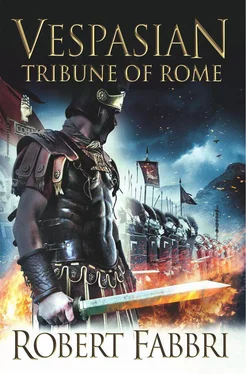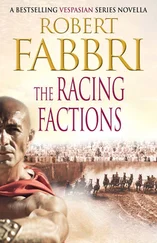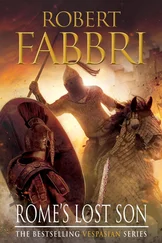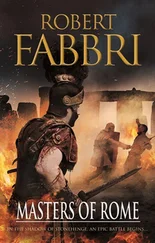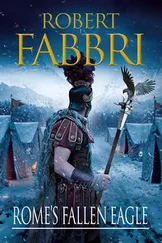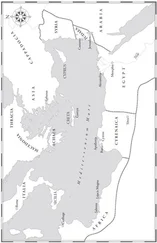Robert Fabbri - Tribune of Rome
Здесь есть возможность читать онлайн «Robert Fabbri - Tribune of Rome» весь текст электронной книги совершенно бесплатно (целиком полную версию без сокращений). В некоторых случаях можно слушать аудио, скачать через торрент в формате fb2 и присутствует краткое содержание. Жанр: Исторические приключения, на английском языке. Описание произведения, (предисловие) а так же отзывы посетителей доступны на портале библиотеки ЛибКат.
- Название:Tribune of Rome
- Автор:
- Жанр:
- Год:неизвестен
- ISBN:нет данных
- Рейтинг книги:3 / 5. Голосов: 1
-
Избранное:Добавить в избранное
- Отзывы:
-
Ваша оценка:
- 60
- 1
- 2
- 3
- 4
- 5
Tribune of Rome: краткое содержание, описание и аннотация
Предлагаем к чтению аннотацию, описание, краткое содержание или предисловие (зависит от того, что написал сам автор книги «Tribune of Rome»). Если вы не нашли необходимую информацию о книге — напишите в комментариях, мы постараемся отыскать её.
Tribune of Rome — читать онлайн бесплатно полную книгу (весь текст) целиком
Ниже представлен текст книги, разбитый по страницам. Система сохранения места последней прочитанной страницы, позволяет с удобством читать онлайн бесплатно книгу «Tribune of Rome», без необходимости каждый раз заново искать на чём Вы остановились. Поставьте закладку, и сможете в любой момент перейти на страницу, на которой закончили чтение.
Интервал:
Закладка:
A few paces away to his right, a knot of fifty or so troopers under Paetus’ command still held firm. Vespasian glimpsed Pomponius tumble from his shying horse as he attempted to force his way to the relative safety of the steady unit through a sea of blood-drenched women. Vespasian called to the troopers closest to follow him, and struck out towards his fallen commander. He forced his horse to rear up so that its flailing front hooves cracked the skulls and collar-bones of those in his path, then he urged it forward to trample its victims. Supported by half a dozen men, he hacked a path to where Pomponius now knelt, surrounded by baying women. As Vespasian approached they pounced upon the legate, throwing him to the ground under a hail of thrashing arms and clawing nails. Vespasian leapt from his horse on to the writhing pile of bodies and stabbed indiscriminately and repeatedly into the unprotected backs of his commander’s assailants, puncturing lungs, piercing kidneys and ripping open arteries in a rapid, murderous assault. His men formed a protective cordon around him as he pulled at the pile of limp corpses to reveal Pomponius, shocked but alive.
‘Can you stand, sir?’ Vespasian asked urgently.
‘Yes, I’m fine, tribune,’ Pomponius replied, hauling himself up, gasping for breath. ‘I owe you more than my life, I owe you my honour; to have been killed by women in these circumstances – what shame.’
At that moment Paetus’ men began a concerted drive forward. In close order, knee to knee, they advanced, riding down any women who stood against them. The other small pockets of surviving troopers took heart and fought with a ferocity that outmatched their desperate opponents. Gradually the small groups linked together, forcing the women back, killing as many as possible, until all the survivors of the auxiliary ala had regrouped. Of the original 480 men there remained only 160 still mounted, and a further 90, including Vespasian and Pomponius, on foot. Nearly half their number lay butchered on the rain-sodden ground. They were now to be avenged.
With the main battle still raging behind them, and the flank of the IIII Scythica now secured by the recent arrival of two more cohorts freed up from the wall, the auxiliaries began to corral the women into a tightly packed herd. A few score managed to escape the net and raced back up to their children, but eventually the main body was surrounded. They stood, now silent, as they awaited their fate. Not one fell to her knees to beg for mercy; they knew to expect none after what they had done. They would die as their men were dying, in full view of their children, defiant to the last.
The troopers dismounted and, with sharp grating of metal against metal, drew their weapons. The order came to advance. Vespasian gripped his sword hilt, raised his oval cavalry shield and moved towards the motionless women. Not even as his sword thrust into the throat of the young girl before him did any of the women move or make a sound. They just stood, defenceless, and defied the Romans to kill them in cold blood. And kill them they did, systematically, vengefully, thinking of their fallen mess-mates.
Vespasian butchered his way forward, without pity, killing young, old, beautiful and haggard; it made no difference to him. He was full of hatred and cold fury. This was not the frenzied elation of battle. This was the awakening of the deep desire that men keep within themselves to see people not of their tribe or creed die, knowing that only through their deaths would they, the killers, feel cleansed and secure.
As the last of the women fell beneath the blows of gore-dripping swords the auxiliaries turned away, their thirst for vengeance sated. There was no victory cheer, no embracing of comrades in relief and joy at remaining alive. They just remounted their horses and waited in silence for orders, scarcely able to look each other in the eye. The wound to their pride ran deep.
CHAPTER XXVII
Vespasian had retrieved his horse and sat next to Pomponius, watching the last stage of the battle below them in the predawn gloom. The main body of the IIII Scythica had fought its way almost to the gates, which were now securely held by the cohorts of Poppaeus’ sortie. The remaining Thracians were being crushed between the two bodies of Roman heavy infantry, their resistance dwindling as more and more fell to the relentless, disciplined swordwork of the legionaries. On the far side of the gates the V Macedonica was playing out the mirror image of the struggle. There was nothing left for the cavalry to do; the Thracian rebellion was finally crushed by the generalship of the man who had been, in part, responsible for its instigation.
‘We should report to Poppaeus,’ Pomponius said quietly, ‘and congratulate him on his victory.’ He raised his arm and ordered the cavalry forward at a trot towards the gates.
‘It should have been your victory, sir,’ Vespasian replied.
‘What do you mean?’ Pomponius asked, kicking his horse forward.
Knowing that Asinius would need a formidable ally in the coming confrontation with Poppaeus, Vespasian told Pomponius of the general’s refusal to obey the Emperor’s and Senate’s order and return to Rome. He told him of his and Sejanus’ treachery and Rhoteces’ and Hasdro’s involvement in it. As they crossed the corpse-strewn field, which now resounded to the clamour and cheers of the victorious legionaries, Pomponius’ anger grew; it was not aimed so much at Poppaeus’ duplicity, but more at the damage done to his personal dignitas. The troops now cheering their victorious general should instead be hailing him. He had been robbed of the glory that was by rights his, and in its place he had had the humiliation of almost being torn to death by a pack of female savages. By the time they reached the gates Pomponius was fuming with indignation. The sight of Poppaeus riding through the throngs of cheering soldiers, helmet raised in the air, accepting their acclaim, was almost too much for him.
‘The treacherous little shit,’ he fumed. ‘Look at him basking in the praise of the men. They wouldn’t be cheering so loud if they knew that he helped to fund this revolt, and that their mates have died solely to further his ambition.’
At the gates a rostrum had been hurriedly set up in front of the smouldering remains of the battering ram. Poppaeus pushed his horse towards it, through the crush of jubilant legionaries. His progress was slow as each man wanted to touch him, or make eye contact, or receive a word of praise from his general. Eventually he reached the rostrum and managed to jump on to it directly from his horse. He raised his arms in the air and, in a dramatic gesture, thrust them forward and apart, to include every man present in his victory. The men of the IIII Scythica and V Macedonica roared their acknowledgement. The noise was deafening. It started as a huge unending wall of sound and then, gradually, it developed into a chant. At first the words were indiscernible, coming only from a small section of the crowd, but they quickly grew in volume as more and more of the delirious legionaries took up the chant. Before long it was clear.
‘Imperator! Imperator! Imperator!’
Thousands of men now chanted in unison, punching their swords in the air in time to the beat. Poppaeus stood alone on his raised dais amidst a sea of faces lit by the first rays of the sun. With his head tilted back and his arms open wide he slowly revolved, taking in the praise that was coming at him from all angles.
Pomponius turned to Vespasian and raised his eyebrows. ‘It’s a brave general,’ he shouted above the din, ‘who allows an army to hail him as “Imperator” in this day and age.’
‘It would be a shame for him if the Emperor found out,’ Vespasian shouted back.
Читать дальшеИнтервал:
Закладка:
Похожие книги на «Tribune of Rome»
Представляем Вашему вниманию похожие книги на «Tribune of Rome» списком для выбора. Мы отобрали схожую по названию и смыслу литературу в надежде предоставить читателям больше вариантов отыскать новые, интересные, ещё непрочитанные произведения.
Обсуждение, отзывы о книге «Tribune of Rome» и просто собственные мнения читателей. Оставьте ваши комментарии, напишите, что Вы думаете о произведении, его смысле или главных героях. Укажите что конкретно понравилось, а что нет, и почему Вы так считаете.
